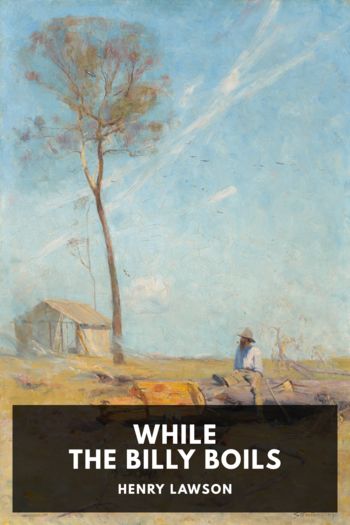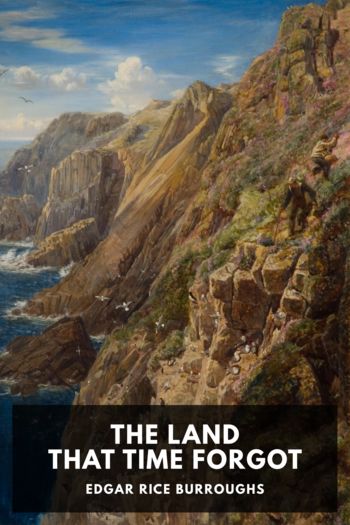While the Billy Boils, Henry Lawson [hardest books to read .txt] 📗

- Author: Henry Lawson
Book online «While the Billy Boils, Henry Lawson [hardest books to read .txt] 📗». Author Henry Lawson
I tell you, without a word of a lie, that we must have drunk about a dozen cups each. We made her fill the teapot twice, and kept her waitin’ nearly an hour, but we couldn’t make her say a word. She never said a single word to us from the time we came in till the time we went out, nor before nor after. She’d made up her mind from the first not to speak to us.
We had to get up and leave our cups half full at last. We went out and sat down on our swags in the shade against the wall, and smoked and gave that tea time to settle, and then we got on to the track again.
The Geological SpielerThere’s nothing so interesting as Geology, even to common and ignorant people, especially when you have a bank or the side of a cutting, studded with fossil fish and things and oysters that were stale when Adam was fresh to illustrate by.
Remark made by Steelman, professional wanderer, to his pal and pupil, Smith.The first man that Steelman and Smith came up to on the last embankment, where they struck the new railway line, was a heavy, gloomy, labouring man with bowyangs on and straps round his wrists. Steelman bade him the time of day and had a few words with him over the weather. The man of mullock gave it as his opinion that the fine weather wouldn’t last, and seemed to take a gloomy kind of pleasure in that reflection; he said there was more rain down yonder, pointing to the southeast, than the moon could swallow up—the moon was in its first quarter, during which time it is popularly believed in some parts of Maoriland that the southeaster is most likely to be out on the wallaby and the weather bad. Steelman regarded that quarter of the sky with an expression of gentle remonstrance mingled as it were with a sort of fatherly indulgence, agreed mildly with the labouring man, and seemed lost for a moment in a reverie from which he roused himself to inquire cautiously after the boss. There was no boss, it was a cooperative party. That chap standing over there by the dray in the end of the cutting was their spokesman—their representative: they called him boss, but that was only his nickname in camp. Steelman expressed his thanks and moved on towards the cutting, followed respectfully by Smith.
Steelman wore a snuff-coloured sac suit, a wide-awake hat, a pair of professional-looking spectacles, and a scientific expression; there was a clerical atmosphere about him, strengthened, however, by an air as of unconscious dignity and superiority, born of intellect and knowledge. He carried a black bag, which was an indispensable article in his profession in more senses than one. Smith was decently dressed in sober tweed and looked like a man of no account, who was mechanically devoted to his employer’s interests, pleasures, or whims.
The boss was a decent-looking young fellow, with a good face—rather solemn—and a quiet manner.
“Good day, sir,” said Steelman.
“Good day, sir,” said the boss.
“Nice weather this.”
“Yes, it is, but I’m afraid it won’t last.”
“I am afraid it will not by the look of the sky down there,” ventured Steelman.
“No, I go mostly by the look of our weather prophet,” said the boss with a quiet smile, indicating the gloomy man.
“I suppose bad weather would put you back in your work?”
“Yes, it will; we didn’t want any bad weather just now.”
Steelman got the weather question satisfactorily settled; then he said:
“You seem to be getting on with the railway.”
“Oh yes, we are about over the worst of it.”
“The worst of it?” echoed Steelman, with mild surprise: “I should have thought you were just coming into it,” and he pointed to the ridge ahead.
“Oh, our section doesn’t go any further than that pole you see sticking up yonder. We had the worst of it back there across the swamps—working up to our waists in water most of the time, in midwinter too—and at eighteenpence a yard.”
“That was bad.”
“Yes, rather rough. Did you come from the terminus?”
“Yes, I sent my baggage on in the brake.”
“Commercial traveller, I suppose?” asked the boss, glancing at Smith, who stood a little to the rear of Steelman, seeming interested in the work.
“Oh no,” said Steelman, smiling—“I am—well—I’m a geologist; this is my man here,” indicating Smith. “(You may put down the bag, James, and have a smoke.) My name is Stoneleigh—you might have heard of it.”
The boss said, “Oh,” and then presently he added “indeed,” in an undecided tone.
There was a pause—embarrassed on the part of the boss—he was silent not knowing what to say. Meanwhile Steelman studied his man and concluded that he would do.
“Having a look at the country, I suppose?” asked the boss presently.
“Yes,” said Steelman; then after a moment’s reflection: “I am travelling for my own amusement and improvement, and also in the interest of science, which amounts to the same thing. I am a member of the Royal Geological Society—vice-president in fact of a leading Australian branch;” and then, as if conscious that he had appeared guilty of egotism, he shifted the subject a bit. “Yes. Very interesting country this—very interesting indeed. I should like to make a stay here for a day or so. Your work opens right into my hands. I cannot remember seeing a geological formation which interested me so much. Look at the face of that cutting, for instance. Why! you can almost read the history of the geological world from yesterday—this morning as it were—beginning with the super-surface on top and going right down through the different layers and stratas—through the vanished ages—right down and back to the prehistorical—to the very primeval or fundamental geological formations!” And Steelman studied the face of the cutting as if he could read it like a book, with every layer





Comments (0)